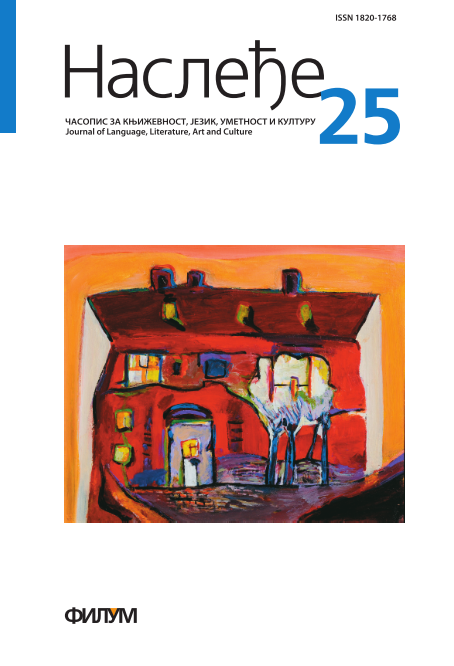THE MEANING ANALYSIS OF SERBIAN TRANSLATION EQUIVALENTS FOR ENGLISH ADJECTIVAL COMPOUNDS
Keywords:
compounds, adjectival position, English, Serbian, translation equivalence, meaning analysisAbstract
This paper is concerned with the contrastive relationship between English and Serbian in terms of adjectival compounds. The empirical part of the research has been done on the sample of over 1500 examples of compound lexical items on adjectival sentence positions, sellected from a corpus of around one million words sourcing from various works of written language. A number of corresponding units from both languages has been determined on the basis of translation equivalence, followed by an analysis of their meaning analysis. The results have established ten potential kinds of relations between the original compounds in English and the equivalent/correspondent form in Serbian when there is a difference in meaning, with interpretations of the linguistic and extralinguistic reasons that condition the change. The majority of around 65% equivalents/correspondents in the target language are concurrent with the semantic content of the lexeme in the source language.
References
Корпус
Heather, Nick (1978) Radical Perspectives in Psychology, London: Methuen.
Хедер, Ник (1980) Радикалне перспективе у психологији, Београд: Нолит. (превод: Љиљана Левков).
King, Stephen (1981) Cujo, New York: The New American Library.
Кинг, Стивен (1987) Куџо, Горњи Милановац: Дечије новине. (превод: мр Светлана Безданов Гостимир).
King, Stephen / Peter Straub (1985) The Talisman, New York: Berkley Books.
Кинг, Стивен / Питер Страуб (1995) Талисман, Горњи Милановац: Дечије Новине. (превод: мр Светлана Безданов-Гостимир, мр Ранко Недељковић).
Рајт Милс, С. (1964) Социолошка имагинација, Београд: Савремена школа. (превод: др Ратољуб Д. Додић).
Travelyan, G. M. (1965) English Social History, London: Longmans, Green and Co.
Травелијан, Г. М. (1982) Друштвена историја Енглеске, Београд: СКЗ. (превод: др Веселин Костић).
Williams, Raymond (1973) Drama from Ibsen to Brecht, Harmondsworth: Penguin Books.
Вилијамс, Рејмонд (1979) Драма од Ибзена до Брехта, Београд: Нолит. (превод: др Марта Фрајнд).
Wright Mills, C. (1971) The Sociological Imagination, Harmondsworth: Penguin Books. 9-248.
Литература
Адамс 1976: V.Adams, An Introduction to Modern English Word-Formation, London: Longman group.
Бауер 1983: L. Bauer, English Word-Formation, Cambridge: Cambridge University Press.
Болинџер 1983: D. Bolinger, Meaning and Form, London: Longman.
Ђорђевић 2004: Р. Ђорђевић, Увод у контрастирање језика, Београд: Универзитет у Београду, Филолошки факултет.
Ћорић 2008: Б. Ћорић, Творба именица у српском језику, Београд: Друштво за српски језик и књижевност србије.
Ивир 1985: V. Ivir, Tehnika i teorija prevođenja, Sremski Karlovci / NoviSad: Centar ‘Karlovačka gimnazija’ / Zavod za izdavanje udžbenika.
Клајн 2002: И. Клајн, Творба речи у савременом српском језику I: слагање и префиксација. Београд: Матица Српска / САНУ / СКЗ.
Љунг 1970: M. Ljung, “English Denominal Adjectives”, Acta Universitatis Gothoburgensis, 21, Lund, Studies in English.
Марчанд 1969: H. Marchand, The Categories and Types of Present-Day English Word-Formation, Munich: C. H. Beck.
Стевановић 1991а: М. Стевановић, Савремени српскохрватски језик, том I, Београд: Научна Књига.
Сурдучки 1981: М. Сурдучки, “Именичке сложенице без спојног вокала у српскохрватском језику”, Научни састанак слависта у Вукове дане, 7, Београд.






